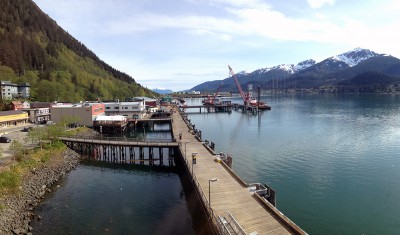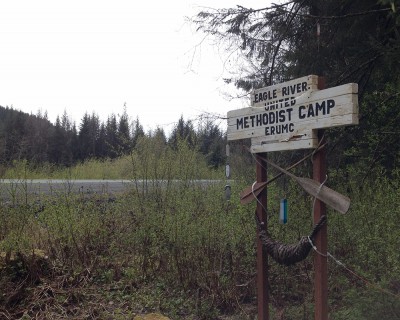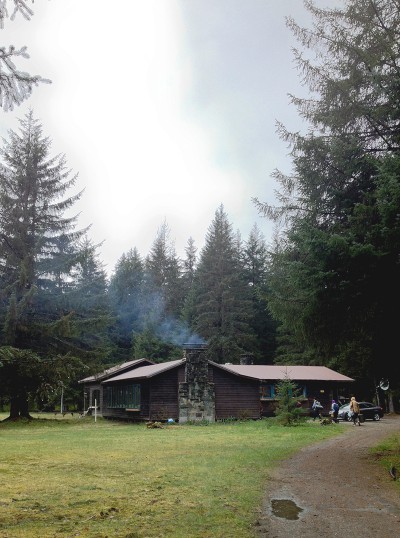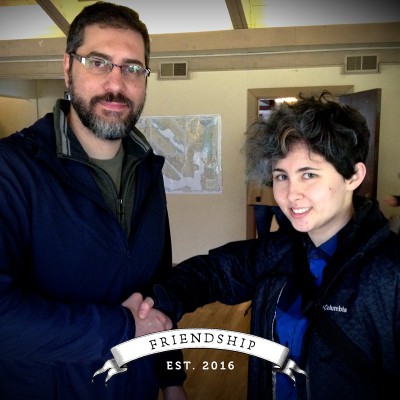Last week, I returned from Comics Camp in Juneau, Alaska! It was really, really great. I made, renewed, and formalized many friendships, and I left camp more inspired, less cynical, and more joyful than I had been going in.
If you’ve seen my “True Stuff from Old Books” talk, you’ve probably heard me read this bit, from an 1886 Frank Leslie’s article called “Camping Out”:
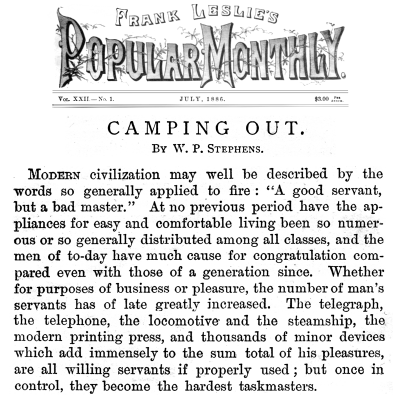
Stumbling across this particular article is what first gave me the idea to start compiling and sharing True Stuff from Old Books selections at all.
It succinctly illustrates my favorite characteristic of this sort of material: it’s a beacon from the past, telling those of us here in the future that we’re not alone. We who sometimes feel overwhelmed by the present are kin to those who felt the exact same way in the past, about their own present. The feeling is not a failing on our part; it is simply human nature.
The article begins:
MODERN civilization may well be described by the words so generally applied to fire: “A good servant, but a bad master.” At no previous period have the appliances for easy and comfortable living been so numerous or so generally distributed among all classes, and the men of to-day have much cause for congratulation compared even with those of a generation since.
Whether for purposes of business or pleasure, the number of man’s servants has of late greatly increased. The telegraph, the telephone, the locomotive and the steamship, the modern printing press, and thousands of minor devices which add immensely to the sum total of his pleasures, are all willing servants if properly used; but once in control, they become the hardest taskmasters.
The telegraph and telephone offer a ready and useful service at all times; but, again, they often become the most rigid fetters, binding a man’s whole life to the office and exchange. Steam has increased to an enormous extent the ease and pleasure of traveling, but it is now too often used as a means for a rapid rush from place to place, with none of the pleasures which accompany more deliberate travel; and the many other adjuncts are too generally misapplied as a means for accumulating a little more money or building up a short-lived fame at the expense of health and true enjoyment.
Men have come to live fast, rather than well. (Emphasis added)
That’s the part I normally read out loud.
But that’s just the introduction to a much longer article, which in its entirety is about the pleasures of disconnecting from society and reconnecting with the outdoors.
There’s an extended section making fun of the ill-preparedness of novice campers: “When the meal is finally ready, it is a mixture of partly burnt, partly raw food, mingled with ashes, bits of stick, etc., that would scarcely tempt the appetite of an ostrich, and that even our tired campers are glad to turn away from in spite of their hunger.” It’s funny, but that whole section is really long, so I won’t reprint it here — I’ve put in a separate post if you’d like to read it.
I thought I would share some other parts of the article, though, that mirror some of how I felt about Comics Camp.
Picking up from where the previous excerpt left off:
…Men have come to live fast, rather than well.
The wise man is he who, while appreciating and utilizing all these privileges to the fullest extent, has independence of mind sufficient to dispense with them at times, and to refresh himself and renew his life and vigor by a short return to mother earth, and a more primitive form of existence.
The average American, with his characteristic energy, is apt to devote himself early in life to some special object, which he probably will attain eventually, but for years he has time neither for rest nor pleasure. When he is in the position to enjoy a well-earned respite, all capacity for doing so has been lost, and he must remain a money-getting machine or die speedily of ennui.
The great importance of recreation, and especially of outdoor sports, was long lost sight of in the busy days of our earlier history, when a vigorous outdoor life was followed by most men from necessity, but there came a time, later on, when mercantile pursuits began to overbalance the agricultural, and it seemed as though the health of the nation must suffer from a too close devotion to work.
Comics Camp was an adjunct to the Alaska Robotics Mini-Con I mentioned in my last post. Perhaps some of you reading this were at the con! I had a lovely time there, it was a pleasure meeting readers from Alaska.
On the evening after the convention, we piled into a school bus and spent three nights at a church camp in the outskirts of Juneau.
…Fortunately a reaction has now set in. Men, and women too, realize the importance of more fresh air and outdoor exercise, and sports of all kinds were never in a more promising condition in America than they are to-day.
Each, from yachting to lawn-tennis, has its patrons and its proper place as an agent of health and a means to a higher physical life; but none is […] so pleasant and beneficial as a few weeks spent under canvas in the open air, or, as it is generally called, camping out.
There was no internet at the camp, but there were cabins, and campfires, and hiking, and crafts, and creative workshops led by peers for the benefit of peers, and lots of good food and conversation.
…What is needed is a period of rest and repose, free from all cares of business, with pleasant and healthful exercises and sport, and without too many of the inevitable deprivations and discomforts…
The permanent camps are fitted up rather more elaborately than those in tents. A stove of simple construction is fitted for cooking, chairs and tables of rustic design are improvised, beds are made of a rough framework covered with tightly stretched canvas, or hammocks are swung, and the walls are ornamented with trophies from the woods…
No morning paper breaks in with an unwelcome interruption. No stock “ticker” tells of rising or falling markets, and for a time the annoyances of business and the exactions of society may be neglected with impunity.
Without access to the internet, a question that could be Googled in five seconds would instead result in an impassioned 20-minute discussion. Without distractions, we found ourselves turning inward, to each other. I left my phone in my cabin most of the time (which is why some of these pictures are courtesy of pals).
We played a mini-LEGO tournament. I got second place, incredibly enough, but new friend Katie Shanahan was the champion!
We kept a list of things to Google when we got home. We joked about “calling up the internet” on a landline and trying to use touch-tone to navigate around a browser window.
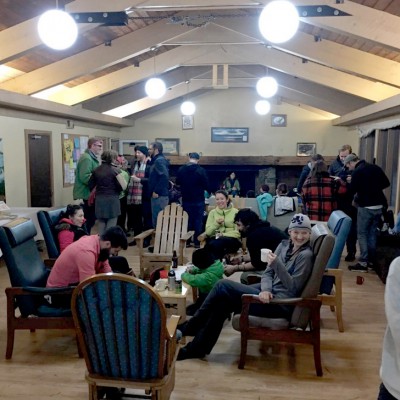
…To some central point chosen for its natural beauty, Lake George or the Thousand Islands, come hundreds of pilgrims from all quarters, not strangers to each other, but nearly all bound by one common tie, whose greatest pleasure it is to meet together for a couple of weeks each year in the hearty companionship that a life in camp engenders.
Tents of all patterns are pitched by the score on the hillside and in the grove. Flags and pennants fly from high trees; at night huge camp-fires and rows of Chinese lanterns light the scene, while the inhabitants of this curious and ephemeral city vie with each other in the variety and brightness of their picturesque apparel.
The time is filled with races, fishing, short trips about the vicinity, in visits to the ladies’ camp a mile away; and, best of all, in the still hours of the Summer night, when the fire burns up from an enormous pyramid of wood on the highest hilltop, in songs and stories of other camps, of long cruises, of adventures on the Mississippi, on Lake Gorge, in the Everglades of Florida, in the wilds of Northwestern Canada and on the rivers of India — for the canoeist of to-day cruises everywhere — and wandering in distant lands, every experience is carefully treasured until the time when he returns, as all do, to this shrine of the craft, to be related to listening friends.
There were lots of good times around campfires. When it was ghost story time, I told a totally true one about a curious herring-boat vanishing from Helsinki and appearing in Reykjavík under mysterious circumstances.
When it was singalong time, we sang one of the old traditional favorites.
When it was late and cold and rainy, we huddled under sleeping bags and dared each other to stay up longer.
…After half an hour over pipe and book, the light is turned out, all is made snug, and the tired canoeist is soon dreaming of a Summer camp a year, instead of a fortnight, long.
Next morning he is up by sunrise, for time is very precious; his breakfast is ready; all is cleaned and packed away, and the canoe launched. Off again, under sail or paddle, he hurries here, or loiters there at will, stopping, perhaps, for dinner, and then off again, until he turns toward home in time to return to the white collar and black coat of civilization in the evening, or, at latest, to be at his desk in the office next morning.
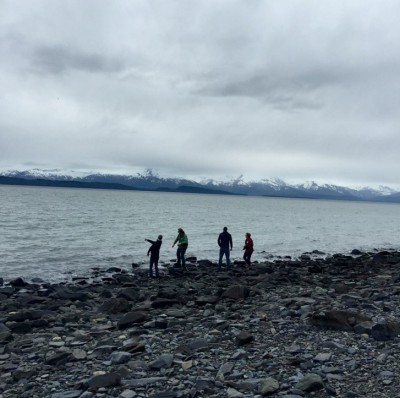
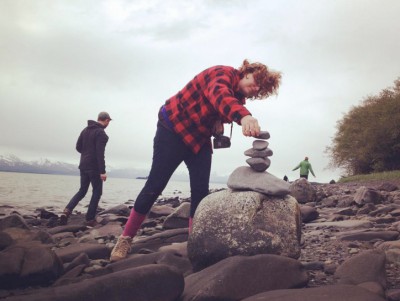
On the final night, the camp band (Molly, Seth, Marian, and Nicole) sang a song about how much they loved and appreciated the hard work the camp cook was doing. Her name was Juste, so they sang a version of “Jesse’s Girl” that they changed to be about “Juste’s Grill.”
It was one of the sweetest things I’ve seen in a long time. It brought tears to my eyes, I will not lie.
It did not seem saccharine or silly. Nobody was too cool for school. We, citizens of the internet, had re-learned how to be sincere.
It was incredible.
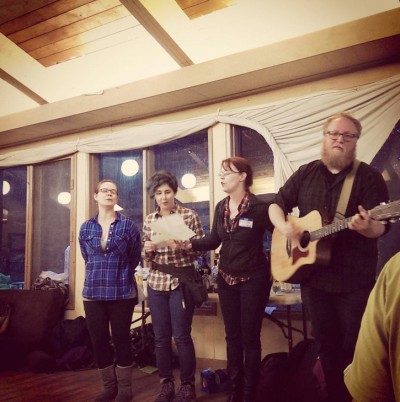
As I mentioned above, I also formalized a number of friendships. I came to believe in the value of putting a stake in the ground and saying, without ambiguity, “Yes. We, previously acquaintances or strangers, are now each other’s friends.”
…Strange as it may seem, the life, like that of the sailor, has its own peculiar fascination — once away from it and amid the pleasures of the city, a restless longing takes possession of one which is satisfied but by a return to the freedom and vigor which only a close intimacy with earth, air and sky can give.
Truer words were never written.
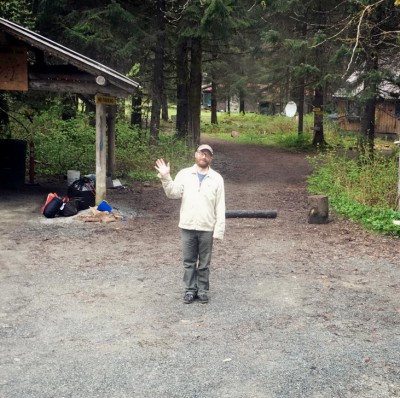
Pat Race, pictured above, camp director and mastermind extraordinaire, has just opened a mailing list so folks can be informed about next year’s Comics Camp.
I hope you will consider it!!
#ComicsCamp Team Photo! pic.twitter.com/z5DtU62z4U
— Patrick Race (@alaskarobotics) May 5, 2016

